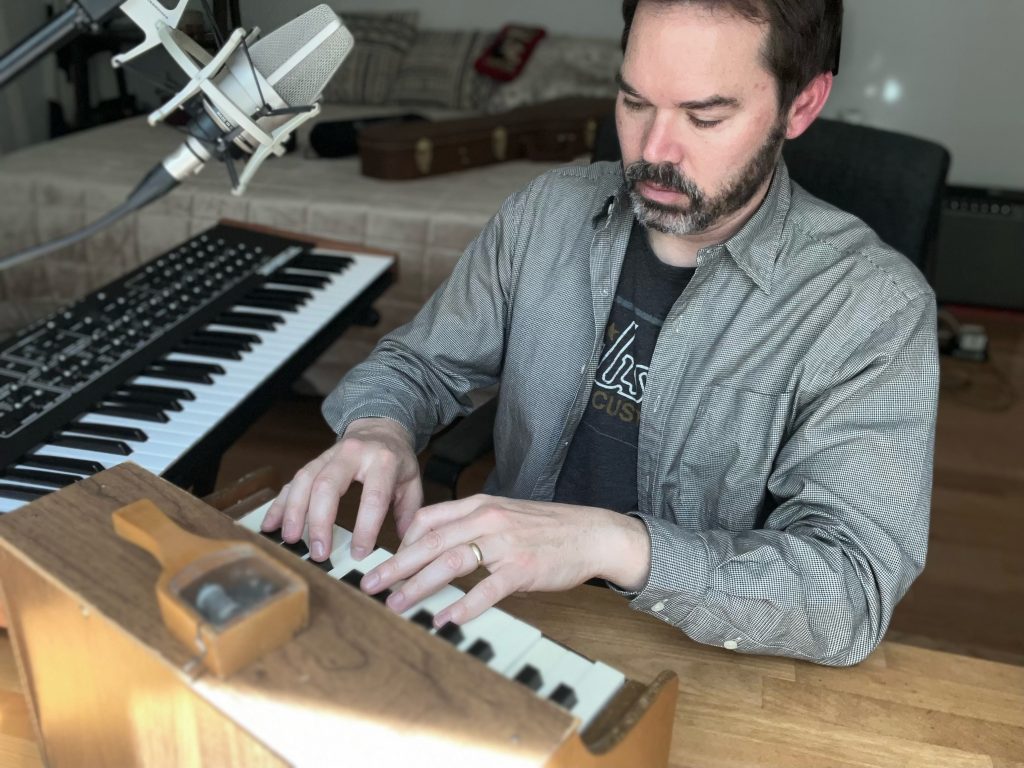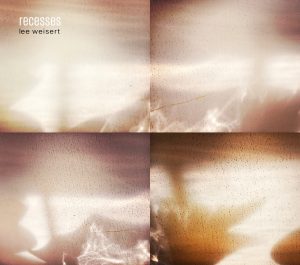
Associate Professor Lee Weisert released his latest album, Recesses, in April on New Focus Recordings. The album includes performances and sounds contributed by fellow music department faculty members Allen Anderson, Nicholas DiEugenio, Melissa Martin, and Matthew McClure (former faculty member), and artwork by Tama Hochbaum. The album was included in The Best Contemporary Classical on Bandcamp: April 2023 and was praised as a “dazzling universe of electro-acoustic sound.”
We reached out to Weisert to learn more about this new album, the processes that made it, and the people and places which inspired it.
UNC Music: What inspired you to write Recesses?
Lee Weisert: I started writing the music for the album during a fellowship at UNC’s Institute for the Arts and Humanities. That fellowship is amazing—in addition to a semester off from teaching to work on your research, you also have a weekly discussion with the other fellows, who are from all different areas. In my group, there was a linguist, a novelist, a sociologist, an art historian, and a social media researcher.
Hearing them talk about their work with such clarity and depth, and then having them comment on and ask questions about my work was transformative.
I’m used to talking about my music with other composers and musicians, and a lot of things are taken for granted in those conversations. This group challenged me to think more broadly about why I’m doing what I’m doing and to articulate what is most central and meaningful to me in my music.
UNC Music: Who are your biggest musical influences, particularly in regard to this album?
Weisert: I made a Spotify playlist of a bunch of stuff that I used to get me into the right mindset while writing the music—the playlist was even called “Recesses.” There was a lot of Japanese experimental music on there, people like Ikue Mori, an electronic music improviser, and Taku Sugimoto, who writes very quiet and beautiful guitar music. Ryuichi Sakamoto was on there as well, a legend who recently died.
There are also some non-musical influences. One is the filmmaker David Lynch, especially his short film Rabbits, which is very strange and is basically just a feeling captured in film. Another rabbit-based inspiration is the children’s book Goodnight Moon by Margaret Wise Brown. I’ve always loved that book—the patient pacing and dreamlike feeling are things I tried to imitate in my music.

UNC Music: Do you have a favorite track on the album?
Weisert: It’s a bit hard to say because the first three tracks could almost be thought of as one long continuous piece. The last piece, Similar Speeds, is kind of a “bonus track” that I wanted to include because it’s a fun piece and I had the room at the end to put it on. But the first three tracks are all called Recesses and the breaks between them are arbitrary in a way because the music just kind of wanders forever. I actually first considered connecting them all into one long 45-minute track, but decided it was nice to have breaks every now and then. That said, there are moments within the tracks that are my favorites. I like the beginning of the first track, especially Nick DiEugenio’s violin playing is so beautiful. I also like the very end of the third track (Recesses II) with all of the little electric guitar gestures fluttering around. There is also one section in the first track that I don’t really like, but I won’t say which part it is.
UNC Music: What was the recording process like for this album?
Weisert: The music was recorded bit by bit over several years. The writing process was somewhat unconventional in that way—I recorded all of the sounds first before I started “composing.” The performers—Allen Anderson, Nicholas DiEugenio, Jonathon Kirk, Melissa Martin, and Matthew McClure—were all recorded separately and most of it was just improvising different ideas and fragments that none of us had any idea of how they would be used. Probably 80-90% of what we recorded wasn’t ever used in the music. But having all of that material to work with allowed me to play around with endless combinations of things and find unexpected musical moments that I could never have thought of myself.
UNC Music: What do you hope listeners will take away from the album?
Weisert: I can’t say that I want them to take anything away, specifically. I tried to put a lot of sound in there to make people’s ears happy. Obviously, this is not exactly “Top 40” music, so it’s enough to me just if some people listen to it and, best-case scenario, someone finds it enjoyable or even fulfilling in some way.
I tried to make the music so you can listen on different levels—on the top level it moves very slowly as a series of “sound environments,” but you can also listen down on the micro-level to all of the fast-moving gestures and collisions that are happening and try to keep up with all of that.
UNC Music: Is there anything else you’d like readers to know about Recesses?
Weisert: One funny thing is that my cats actually influenced how I wrote the music a lot. They like to sleep on my desk when I’m working, and I noticed that their ears would perk up when they heard certain sounds from the speakers. After I noticed that I started experimenting with things in the music to see how they would respond and it got me thinking about how we hear and understand sounds on a subconscious, evolutionary level. The album has a lot of moments that are playing with our subconscious assumptions about sounds, how they behave, their source, location, things like that.
Listen to Recesses on Spotify, Apple Music, Bandcamp, or wherever you stream music.
Interview by Catherine Zachary, B.Mus. ’10.
